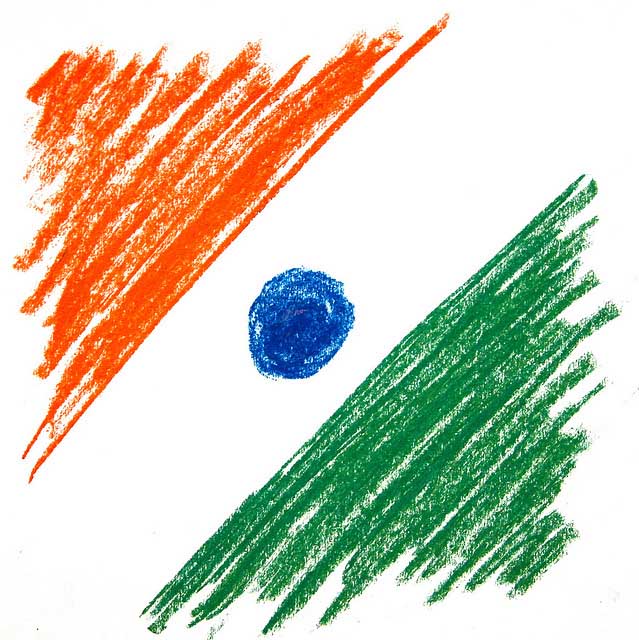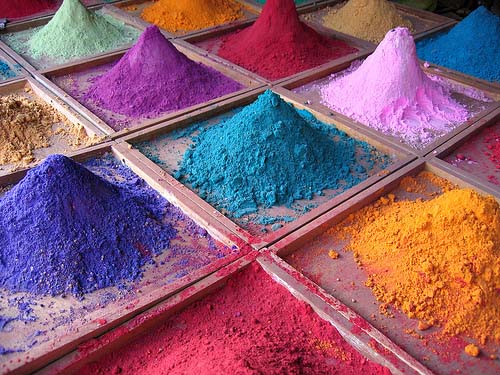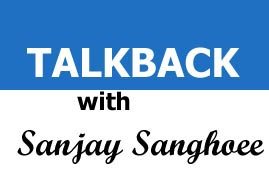NRI? Indian-American? Desi? American? Indian? Or All?
We all talk about “being” Indian in America, but what about “becoming” Indian? As an NRI and an Indian-American, that’s an experience I had never thought I would have but that is precisely what is happening. Becoming Indian feels a bit like a metamorphosis – a complete change of form, structure, or substance – but it’s not. It’s more like a hidden and suppressed side of our persona and outlook finally refusing to be denied and seeping slowly into our life to change it forever.

Desi Fish out of Water: Picking Sides
I came to the US in college and having grown up in Dubai, Nepal and India, I was a bit of a fish out of water. The diverse and multicultural nature of Manhattan and Columbia University suited me just fine but the pressure to assimilate into mainstream American culture was pretty strong too and it created a conflict for me. I resolved this conflict in the short term as I suspect a lot of Indians do – by picking a side, the American side. I was so adamant, in fact, NOT to be considered Indian that I even refused to join any South Asian associations or fraternize with other Indians… This went on for more than a decade.
It was purely by accident that I got thrown into the circle of Indians in New York City at a later point in my life, mostly because I was trying to publicize my novel MERGER and needed help from “my people”. I merrily got involved in Indian activities and groups to hawk my wares, never suspecting that what I would really find was not publicity for my book but a new awareness of who I really am, where I come from, and a sense of camaraderie that had eluded me for longer than I could remember.
Being Indian and Becoming Indian
Not that it came quickly or easily; in fact it took several years before I even realized what was happening and that I suddenly had a good group of Indian friends that I enjoyed spending time with. Beneath it all, of course, was the common cultural bond we all have (whether we like admitting it or not) – which includes superficial stuff like spicy food, cricket and Bollywood movies to more serious things like common concerns about life, career, marriage, parents. It’s simply easier to communicate with people who know where you’re coming from and what you’re actually talking about.
Cut to now, and a new factor has crept in; namely that of values. As I get older, I find myself trying to rediscover some of the values of our Indian culture which shaped my childhood and still run as an uneasy undercurrent through my adult psyche, but for the most part have been suppressed in the desire to adapt to the New York lifestyle. As with all value systems, of course, not everything is desirable and it’s necessary to pick and choose the best of both Indian and American values in order to be truly happy.

More specifically, our emphasis on family, commitment and a sense of romanticism about life are good things that should never allowed to be impacted by the increasingly cynical and success-oriented American mindset. Conversely, the archaic social restrictions of Indian culture have no place in our modern age. If we can find the right balance, we can be both Indian and American without compromising either identity.
All right, that’s the good part; where’s the problem? The problem is in the transformation process, the transition from a two-dimensional existence to a three-dimensional one. Not only is it temporarily confusing and dramatic but can lead to period of estrangement from either or both communities and just plain weirdness.
The good news is that with a couple of Advils, a deep breath and some patience, this challenge can be overcome. The important thing to remember is that this process is not only natural but also inevitable; one that we were all destined to go through the moment we came into this world in an Indian body. I’m not advocating that we should all suddenly start chanting “Mera Bharaat Mahaan” spontaneously (which would be a little disturbing), but more accurately be able to say “Mera Bharaat Awesome” with pride and understanding of why we feel that way.
Personally, I love kathi rolls, chaat, the criminally catchy music of Bollywood and impossibly beautiful women dancing with jaw-dropping synchronicity and am not ashamed to admit it. Not to mention having to convince the cashier at Dunkin Donuts that I don’t drive a cab for a living and of course calling everyone uncle and aunty indiscriminately… Sure, it’s all a little cheesy and the emotional drama inherent in Indian culture is hilarious, but it’s also fantastic and special. Just because we’re as much at ease in the more ordered and pragmatic reality of the New World doesn’t mean we should give up the eccentricities that make us unique!
Since this is an interactive forum, please do tell us your experiences with rediscovering your Indian heritage and let me know what you think of my thoughts.

Sanjay Sanghoee, author of ‘Merger’, a corporate thriller available on Amazon, blogs on political, financial and social topics which are carried weekly by several radio stations. He has written spec episodes for TV shows like ‘Law & Order: SVU’ and a screenplay for ‘Merger’. He has an MBA from Columbia Business School and worked on Wall Street for 15 years in investment banking and hedge funds. www.sanghoee.com
Related Article:


21 Comments
Pingback: Twitted by PranayGupte
Sanjay Sanghoee, congratulations on publishing “Merger”.
I was born in Kenya, spent the first 8 years of my life in Mombasa, later immigrating to Mumbai as a child with my parents. Later at the age of 23 I joined the “Merchant Navy” and got to experience different cultures and civilizations during my routine duty as a “Marine engineer” at sea.
Many of my school as well as Merchant Navy colleagues have migrated to other country’s from India, some of them surprising me by their decisions. Most of them are very well-off and honestly I personally feel that India, with a lot of its faults is still one of the best countries to call home.
I am a widely traveled person, backpacking to various cities in the world after quitting the Merchant Navy in 2008. I also love writing and thanks to the internet have posted my blogs, basically a “Log” as well as memoirs. My blogs are on various topics.
Although I am from Nepal living in UK I could not be any closer culturally to any NRI in US. Having studied in an Indian school and college and having a sister married to a pilot in Bihar, I feel Indian culture ingrained in me. These days I feel like I am living a life in two halves. I work four days shift and get another four off. While at work I am in a different world trying mainly to amalgamate with the British people and ways which sometimes I find quite hard although I feel very comfortable as a professional.
One the other hand my four days off I spend with family and socialize mainly with local Nepalese community. Bottomline is it is a mountain to climb to assimilate a different culture in a short span as an adult. I have similar concern as rest of you about my one year old daughter, but adjusting to different cultures will come more naturally to her i am confident.
Although I am from Nepal living in UK, I could not be any closer culturally to any NRI in US. Having studied in an Indian school and college and having a sister married to a pilot in Bihar, I feel Indian culture ingrained in me. These days I feel like I am living a life in two halves. I work four days shift and get another four off.
While at work i am in a different world trying mainly to amalgamate with the British people and ways which sometimes I find quite hard although I feel very comfortable as a professional. One the other hand my four days off I spend with family and socialize mainly with local Nepalese community. Bottom line is a mountain to climb to assimilate a different culture in a short span as an adult. I have similar concerns as rest of you about my 1-year-old daughter, but adjusting to different cultures will come more naturally to her I am confident
What a well written post! There are so many parents out there who feel the same. Its exactly this sentiment that has prompted so many mom-preneurs to do something about it and start clothing lines and book/toy series. We struggle with the balance …Will we be happy if they (our kids) are balanced decent human beings who appreciate the best of both worlds and love pizza or do we want them to be more entrenched in their roots?
Sanjay-what you’ve written about is something a lot of people living in the US feel towards their respective countries of origin but find it hard to express..but you have beautifully captured it in your article. Congrats!
Mari, your kind words are much appreciated. I don’t have much experience with other cultures in NY but I fully believe that every strong ethnic culture engenders the same experiences for new generations.
Hi Anju, thanks for your post. I think it’s interesting that Indian kids are enticed into appreciating their culture because of the uniqueness factor. I totally agree. I think in our consumer culture in America where everyone eats the same thing, listens to the same music and watches the same movies, it’s refreshing for younger Indians to have something totally different to relate to! I also agree that in the end it’s up to them to decide how they want to lead their life and be who they want to be.
Great post! This crosses into and applies to so many ethnic cultures. Very interesting questions brought up – thank you for giving me a look at your thoughts on this.
Love this topic, always wondered are we really “picking and choosing” from the American and Indian ways, or are we just deciding who we are on the inside. Born in Virginia and raised my entire life in New York City – which I think makes a HUGE difference in terms of location within “America” as NY is so diverse and already sets the tone for blending of cultures, Indian or otherwise…I still struggle with balancing the two cultures at home. Now more so than ever for my kids sake, because they are the ones with the real challenge.
I’m not pushing any one culture over the other with them, it’s up to them to decide who they are and what they want in life. It’s my role to expose them to what I know culturally which is quite minimal in my opinion (sadly) – but my six-year-old sums it up pretty well – he says “We’re lucky because we’re Indian right, we get so many choices for dinner each night, my friends just eat the same old thing everyday, chicken nuggets or pizza – that’s pretty boring mom.”
I do think the kids today have it much easier since being Indian is almost intriguing now in a fun, cool way 🙂
Would love to hear more thoughts on how parents like us today are balancing culture (which includes all values across the board) vs. how our parents (faced with a multitude of challenges themselves) handled it.
Laav, very thoughtful post. You’re absolutely right that Indian culture isn’t just about Bollywood and spicy food although those parts are pretty good! I have to admit that I haven’t delved as deeply into the “real” cultural side of India yet but certainly hope to do so one day.
Ruchi, love your daughter’s Bollywood party! Great way to get kids enthused about the fun culture that we are. Just as long as they were not performing “Sheila ki Jawaani” at 12… 🙂
Hey Bella, welcome to the “dark side”! 🙂
Sanjay, thank you as always for your wonderful articles and insight into the Indian American experience. I really appreciate this article. I think the issues of navigating two cultures and how it shapes one’s identity is so complex and also unique to the individual. That is how it has been for me.
I grew up as an Indian (Telugu) American in the NYC metro area/NJ of the 80s and 90s in a time when you got excited to see another Indian. I always found the Indian American community to be very insular, classist, and fixated on material wealth. I am very cynical when we talk about our so called “Indian values”. I know Indians are as equally messed up as Americans. At the core, is having good human values (family, commitment, integrity, trust, love) about what your cultural or ethnic background is? Being raised in America and interacting with people of so many cultures has made me appreciate diversity and my own Telugu background. I believe human problems are the same everywhere.
Also, how can one define Indian culture to just Bollywood and bhangra? I found hanging with the mainstream South Asian crowd was so limiting. Instead, I discovered Hinduism, Vedanta, yoga, meditation, South Indian classic culture (Telugu, Tamil, and Kannada), and so many other rich aspects of Indian culture on my own.
I believe I am a richer and more open-minded person for it. Many desis would deem me very non-desi for my nonmainstream interests, but I am quite proud of my broad exposure to Indian culture beyond Bollywood, bhangra, and tandoori chicken and naan.
Sanjay..haha!! We were not big Sanjaya fans either!! 🙂
My daughter even agreed to have a “So You Think You Can Dance – Bollywood Night” for her 12th Birthday this year..and all her schools kids(approx 25 gals) had a great time!! I got lots of calls the next day from the American moms who said their daughters had such a great time..from choreographing and dancing on 2 minutes dance to Twist/nagada to getting mehendi done/wearing bindis/dupattas. I even made them all a CD with Bollywood songs…
She was not sure of the idea at first..but as the planning went on..she was so excited!!!
I guess if we are proud of our culture, so will our kids..I think Bollywood becoming mainstream in the US is definitely helping!
Thank you Sanjay for putting into words my exact experience. I grew up in California when there were very few Indian families and even less Indian kids my age. I too am “becoming” Indian living in NYC and proud of it!
Thanks for your kind words, Ruchi! I’m thrilled to hear that your children were rooting for Anoop Desai although I have to confess that as much as I’m firmly in the “desi corner”, I have to draw the line at Sanjaya! 🙂 I couldn’t stand that guy.
Would really love to hear many perspectives and stories,so I would ask everyone to share their own experiences.
Sanjay..Loved your thoughts! I was born in India and brought up in Africa and moved to the US when I was 15…so totally a blend of different ideas/cultures! But somehow from the values instilled in my by my parents..I always have known that I was in Indian on the inside.
I have two kids – 12 yr old daughter and 8 yr old son..I try to instill all the values that I know and keep hoping they will figure out who they are. A quick example..So a couple of yrs ago when Anoop Desai was a contestant on the American Idol show..my kids were rooting for him like crazy!! I have never asked them the question..”are you Indian or American?” But by the support they showed for Anoop or any desi that comes on any reality show like Suvir Saran/Floyd on Top Chef Masters..I know they feel desi on the inside! What more can I ask for as a desi mom! ;)Thx again for sharing your thoughts!
Hi Deepika, thanks so much for weighing in. I think the best way to make sure that your daughters remain in touch with their culture is to keep shuttling them to India for vacations where they can also develop friends and a community within their own age group. Outside of that, I’m pretty sure they will find their own footing in this regard in the natural course of life – although no doubt after giving you a few headaches along the way! 🙂
Deepika, welcome to the club! NRIs are all in the same boat and it’s a life-time process of discovery as one tries to distill the true essence and not give in to old biases or stereotypes. I’m sure Sanjay as well as readers will have much to add to this debate. We would love everyone to share their experiences as these can be so helpful to others.
Lovely…can identify with it..am in Dubai now, and raising 2 lovely ‘Indian’ girls in Dubai- in a very cosmopolitan environment..and keep questioning myself – how to I get them to really know where they are coming from- and don’t want them to grow up as ‘coconuts’.